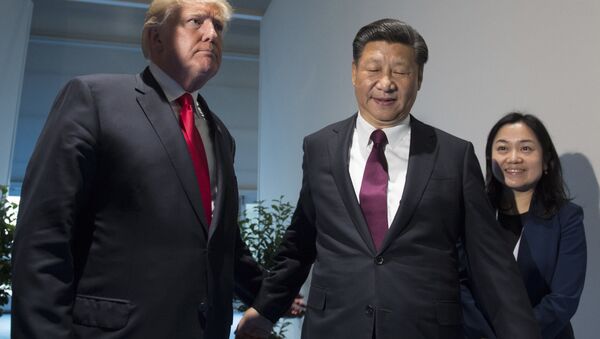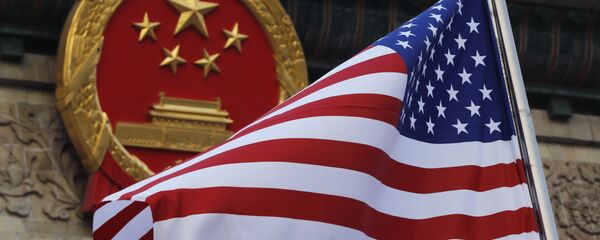Following Chinese Vice Premier Liu He’s visit to Washington last week, the two countries reached "a consensus on taking effective measures to substantially reduce the United States trade deficit in goods with China," according to a joint statement.
Both countries agreed on a "meaningful increase" in US agriculture and energy exports and a US delegation led by US Secretary of Commerce Wilbur Ross is expected to travel to Beijing soon to work out the details of the deal.
Match Trump's Support Base
Prior to Liu’s visit to Washington, the US side demanded China to cut the US trade deficit by $200 billion during the first round of negotiations in Beijing in early May, US media reported. Although both countries failed to specify the value of the proposed US exports expansion to China, experts suggested that the industries covered in the trade deal were enough to satisfy Trump and give him an upper hand in the upcoming midterm US elections.
"The initial demand from the United States on cutting US trade deficit by $100 billion or $200 billion is more of a political gesture, which Trump used to show his firm stance to his supporters ahead of the upcoming midterm elections. Those figures were mostly slogans. For ordinary voters in the United States, if they could sell more products to China and make more money, it would be the most practical results. Compared to other US demands such as improved IPR protection and better access to the Chinese market, ordinary voters cannot feel the effects of the policy changes directly. But if US exports to China can increase significantly, create more jobs and raise salaries, this is more substantial results for them. That’s also why Trump could benefit from this in the midterm US elections," Jin Canrong, a professor in the School of International Studies of Renmin University in Beijing, told Sputnik.
READ MORE: US Treasury Secretary Confirms Trade War With China 'On Hold'
The US president highlighted the optimistic outlook for farmers following the trade agreement with China.
"China has agreed to buy massive amounts of ADDITIONAL Farm/Agricultural Products — would be one of the best things to happen to our farmers in many years!" Trump wrote in a tweet on Monday.
Compared to his top trade adviser Peter Navarro and US Trade Representative Robert Lighthizer, who have been very critical of Chinese industry policies such as heavy government subsidies, Trump has always been more pragmatic when dealing with China, economists suggested.
"There is a group of US officials who have been vocal about the structural or systematic issues with China, such as heavy subsidies for state-owned enterprises, Chinese industry policies or restrictions on foreign investments. Personally, I believe Trump does not care about those issues as much. He focuses a lot more on figures. Officials like [trade adviser] Peter Navarro or [US Trade Representative] Robert Lighthizer want to crush Chinese industries, taking aim at the ‘Made in China 2025’ industry development plan. Trump is not as ambitious as them," Tu Xinquan, dean of China Institute for WTO Studies, the University of International Business and Economics in Beijing, told Sputnik.
China's Weakness
However, when the US Department of Commerce decided to ban US companies from doing business with Chinese telecom giant ZTE, which relies on US microchips as key components in its products, the Chinese side had to offer more concessions to cut a deal with the United States to ensure the survival of ZTE, Chinese economists suggested.
"Personally, I believe the biggest case in this round of US-China trade dispute was the troubles ZTE faced. This case showed the cards the US side has and exposed our weakness. I think the softened stance from the Chinese government has something to do with this case, after realizing this weakness has serious consequences," Tu from the University of International Business and Economics said.
READ MORE: China to Increase Purchase of US Goods to Support Employment in US — White House
The economist explained that it is more difficult to save Chinese companies like ZTE, which relies on US microchips, than helping a Chinese exporter to explore new markets in face of steep US tariffs.
"If Chinese exporters have trouble selling in the US market because of higher tariffs, they can still find alternatives to survive by lowering prices or exploring new markets. It’s more flexible for them. When it comes to cutting off supplies of key components such as US microchips, no matter how much money you want to spend, you still can’t find replacements. It’s no longer about lowered sales. It’s about the company’s survival. The impact of ZTE’s case is even bigger than tariffs on $50 billion worth of products because the tariffs could only hurt Chinese exports and reduce our exports volume. If ZTE goes bankrupt, in addition to the company’s billions of dollars of assets, over tens of thousands of jobs could be lost in related industries. The impact is much stronger," Tu said.
Phased Exports Growth
The Beijing-based economist pointed out that it is unlikely for China to meet US demands of cutting the trade deficit by $200 billion in one year and growth of US exports will be a phased process that extends until the end of Trump’s current term in office.
"The US side understands that it’s impossible to reach the target of $200 billion a year. I think both sides will reach short-mid-term contracts on agriculture and energy products, with the length of 3-4 years. The accumulated amount in the next few years could get close to the target. I think the contracts could extend until the end of Trump’s current term in office. It’ll all be counted as Trump’s political achievements," Tu said.
READ MORE: Have Chinese Tech Companies Found a Safe Haven From US Sanctions?
"Both sides have been focusing on reducing US trade deficit against China during their negotiations. China has made rather significant concessions, which raised concerns in many European countries that China may prioritize purchasing US products in the future. I have seen comments from France claiming the China-US trade deal could hurt interests of European countries," he said.
The expert stressed that boosting Chinese imports of US products is better than restricting Chinese exports to the United States to reduce US trade deficit against China.
The views and opinions expressed by the speaker do not necessarily reflect those of Sputnik.




